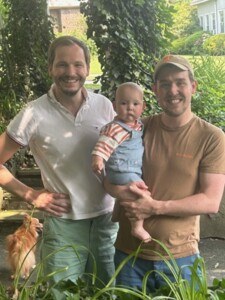What an eventful year!
SURROGATE CARRIED TWINS – ONE THE INTENDED PARENTS’ AND ONE HER GENETIC CHILD
The “you can’t make this up” 2024 surrogacy and adoption award goes to a case I encountered this year involving a surrogate who was pregnant with twins – one the intend parents’ genetic child and one her own genetic child. How could this happen? The embryo transfer was initially cancelled and then rescheduled at the last minute. During the short period between the cancellation and rescheduling, the surrogate became pregnant on her own. Since the surrogate was so newly pregnant, the pregnancy test performed at the time of the embryo transfer did not detect that she was already pregnant. After the birth, the intended parents took custody of their genetic child and the surrogate placed her genetic child for adoption. Two unique, loving families emerged from a difficult surrogacy.
LGBTQ PARENTS STEPPED UP
The good news is that so many LGBTQ families were created in 2024. The bad news is that gay marriage and gay parentage are once more at risk after the election. Appearing as a parent on a child’s birth certificate is rarely sufficient to establish parentage. This year, many same sex parents secured rights not protected by their children’s birth certificates alone, working with me to obtain court orders of adoption or parentage. The orders created universally recognized, irrebuttable proof of parental rights.
DONORS AND INTENDED PARENTS HELPED EACH OTHER
Remarkable compassion led to egg, sperm and embryo donations by friends, family members, and even people connected online. Several same sex families donated eggs, sperm and embryos reciprocally to each other, redoubling generosity.
SIJS PROTECTED CHILDREN FROM DEPORTATION
With vulnerable immigrant children now more at risk of deportation than ever, I was privileged to obtain orders of Special Immigrant Juvenile Status (SIJS) from New York and New Jersey courts for two deserving youngsters this year, providing them a path to legal immigration status. Foreign born children adopted in the U.S. under age 16 are eligible to apply for citizenship. However, if a child is a national of a country party to the Hague Convention on the Protection of Children, as both of my clients were, the adoptee must secure a waiver of residency from the home country, which is almost impossible. With the court orders, the adoptive children could apply for SIJ status to the United States Immigration and Citizenship Service, enabling them to obtain green cards and eventual citizenship without complying with the Hague Convention.
